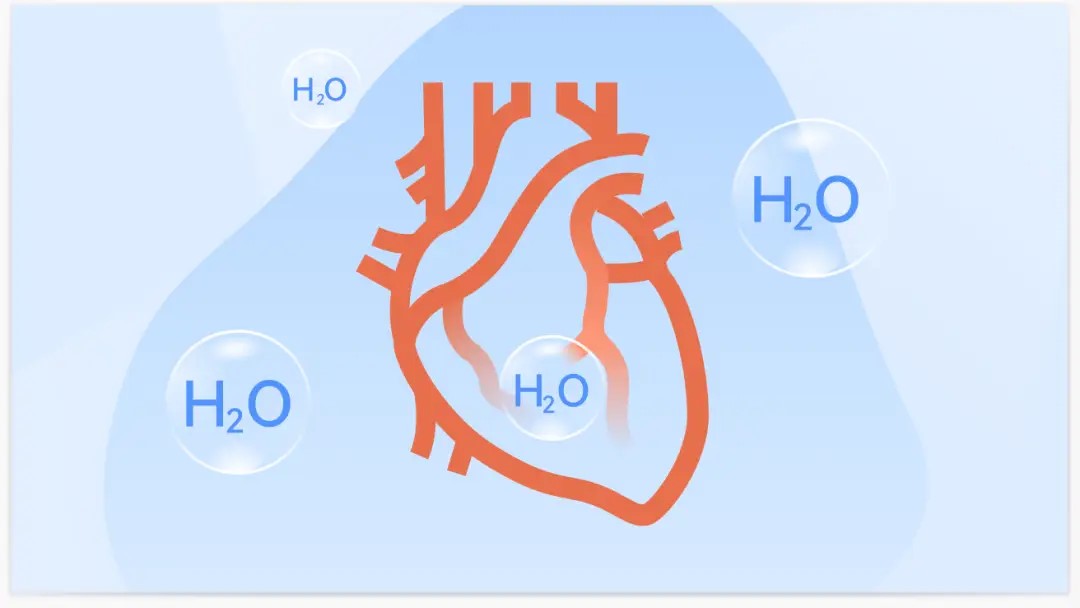
The human body consists of six major nutrients: water, protein, fat, carbohydrates, minerals, and vitamins. Among these, water is the most needed nutrient, playing crucial roles in regulating blood viscosity, promoting circulation, and maintaining metabolism[1].
Are you drinking water correctly, or do you only drink when thirsty and then gulp it down? Here are some hydration tips that can benefit your cardiovascular health.
01: Adequate Hydration Can Prevent Heart Disease
Research presented at the European Society of Cardiology (ESC) conference[2] showed that maintaining good lifelong hydration can reduce the risk of left ventricular hypertrophy and heart failure. In simple terms, drinking enough water protects your heart.
Serum sodium is a precise measurement of body hydration, typically reflecting daily water intake. When we reduce water intake:
- Serum sodium concentration may increase
- Plasma volume decreases
- Anti-diuretic hormone (ADH) release increases
- Renin-angiotensin system activates, a key factor in heart failure development
The study found that mid-life serum sodium levels above 142 mmol/L are risk factors for left ventricular hypertrophy and heart failure. For every 1 mmol/L increase in serum sodium concentration during middle age, the probability of developing these conditions in 25 years increases by 1.20 and 1.11 times respectively[2].
Recommended Daily Water Intake:
- Women: 1.6-2.1 liters
- Men: 2-3 liters
- Chinese Dietary Guidelines 2022: 1.5-1.7 liters for adults
Note: Total fluid intake includes water, tea, beverages, and water from fruits and vegetables.
02: Proper Timing Benefits Heart Health
Key Timing Points:
- Don’t Wait Until Thirsty
- When you feel thirsty, cells are already somewhat dehydrated.
- Regular, Measured Intake
- Drink 150-250ml[3] multiple times throughout the day
- Aim to reach the recommended daily intake gradually
- Four Beneficial Times for Cardiovascular Health:
- After Waking: Blood viscosity is highest in early morning[4], when cardiovascular events are most common. Morning blood pressure is typically highest[5].
- Before Bed: Night-time blood flow slows, increasing viscosity[6].
- During Night Wakings: Another peak time for cardiovascular events.
- Before Meals: Drinking 30-60 minutes before eating can reduce post-meal hypotension[7].
03: Harmful Drinking Habits to Avoid
- Avoid Very Hot Water
- Safe consumption temperature: 10℃-50℃
- Excessive heat can damage oral and esophageal mucosa[8]
- Avoid Very Cold Water
- Can cause gastrointestinal vessel constriction
- May trigger cardiovascular issues at night[6]
- Avoid Drinking Too Quickly
- Can lead to water intoxication
- May cause headaches, vomiting, increased blood pressure[9]
Special Considerations for Heart Patients:
- Coronary heart disease patients should avoid drinking large amounts quickly
- Rapid increase in blood volume can strain the heart
- Severe cases might trigger heart failure[10]
- Patients with cardiovascular or kidney issues should consult doctors about hydration habits
Remember: While proper hydration is essential for heart health, individuals with existing conditions should follow medical guidance for their specific needs.

